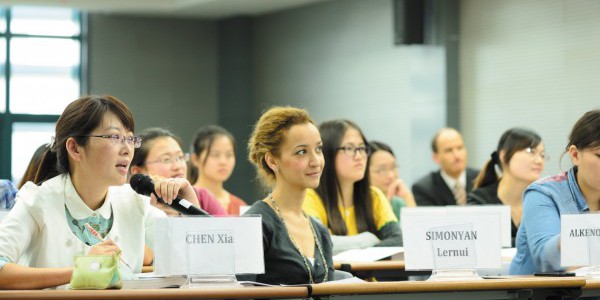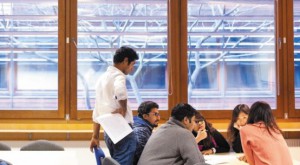
April 1, 2015, by Teaching at Nottingham
Nottingham University Business School: Working with Students to Improve the Learning Experience
In an increasingly competitive, constantly changing sector, Nottingham University Business School (NUBS) is working with the Teaching Transformation Programme to ensure that it maintains its position as one of the world’s leading business schools. The School’s student body is both broad and diverse, with nearly 1,400 undergraduates from over 150 countries; the sheer size of the School means that the proposed Programme Review – working in partnership with the Teaching Transformation Programme to explore the ways in which the design and structure of the School’s programmes of study could be optimised to best suit the interests of the students, whilst still effectively utilising the particular strengths of the staff – might seem a daunting prospect. However, for Professor Sue Tempest, the provision of a holistic, student-centred approach to teaching and learning is central to the Business School’s agenda:
“Increasingly we are having to think about programmes not just in terms of the modules and the content, but how students find the coursework, how one module works with another module. It’s about the overall experience that they are getting across the programme, both the formal teaching and also the informal learning opportunities it might have around group work or project work. We want to make sure that the students are getting a range of experiences which will enable them to excel but which are interesting and rewarding as well.”
Embedding students’ academic development within the curriculum enables the School to foster a culture of engagement, giving a more cohesive sense of student identity which is mutually nurturing, both in terms of giving students the chance to engage in a meaningful way as well as using this ethos as a systemic platform for the design and structure of the School as a whole. The promotion of independent learning and leadership is an obvious priority for the School, but this must be accompanied by a strong sense of community amongst students. Sue Tempest notes:
“One of the things we’re really keen to do is create a stronger community, because we are a big school and we have large numbers of students. It’s not just engaging them in their contact time, we want to think about engaging them in their independent study too. What we want to do is to get the students actively learning and interested in learning, not just in the content issues of their modules and their programmes – to think critically about things, to be reflective, life-long learners. We don’t want them just having the content and leaving the School, we want them to be ready for challenges, once they have gone on in employment, in their own lives, in their wider activities.”
Effective implementation of any change within such a vast School will inevitably require consideration of structural, as well as content-related, issues. As Sue explains, the Programme Review being undertaken with the Teaching Transformation Programme represents an opportunity to address and enhance the Business School’s internal framework and processes:
“Getting the structure right internally is going to facilitate our ability to work with both our colleagues in the School and also with the student community… I think that [the Teaching Transformation Programme across all three campuses] will help us identify what would be the most effective way of giving us a structure that is efficient, agile and responsive to what is going on. Things are changing quite quickly now and we need to be responsive to that.”
Further information on the Programme Review process can be found via the Teaching and Learning pages.
For more on Academic Development, please contact Dr Ruth Allen in the Teaching and Learning Directorate.
Information on the Nottingham University Business School, including contact details for Professor Tempest, can be found here.
No comments yet, fill out a comment to be the first



Leave a Reply